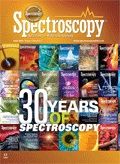From the Publisher
For 30 years, Spectroscopy has provided its readers with valuable content, advice, troubleshooting tips, and insight to many areas of materials analysis. Our mission statement says
Thank You for 30 Years . . . and Counting!
For 30 years, Spectroscopy has provided its readers with valuable content, advice, troubleshooting tips, and insight to many areas of materials analysis. Our mission statement says
Spectroscopy's mission is to enhance productivity, efficiency, and the overall value of spectroscopic instruments and methods as a practical analytical technology across a variety of fields. Scientists, technicians, and laboratory managers gain proficiency and competitive advantage for the real-world issues they face through unbiased, peer-reviewed technical articles, trusted troubleshooting advice, and best-practice application solutions.
I believe we have lived up to that mission statement very well during the past three decades, but it would not have been possible without the invaluable work of our columnists, peer-reviewed authors, editorial advisory board, advertisers, and, of course, the editorial and sales staff at Spectroscopy-both past and present. In honor of our 30th anniversary celebration this month, I would like to say thank you to everyone that has contributed to Spectroscopy over the years. I'd also like to extend a thank you to our readers, who always push us to do better and provide the best content to meet their specific needs.
Our magazine is a staple in the spectroscopic community because of the hard work and dedication of our staff and contributors. Below you will find photos of the terrific and hard-working staff at Spectroscopy. Please feel free to say hello to us at conferences and industry events.
Thank you again to everyone who has been a part of this publication. Here's to the next 30 years!
Michael J. Tessalone
Science Group Publisher
mtessalone@advanstar.com

Michael J. Tessalone

New AI Model Accelerates Infrared Imaging for Protein Analysis, Study Reveals
May 7th 2025A new study led by Ayanjeet Ghosh of the University of Alabama presents a transformative approach to analyzing infrared (IR) imaging data, with promising implications for neurodegenerative disease research.